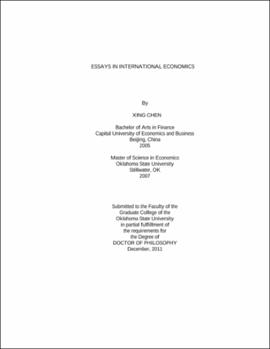| dc.contributor.advisor | Munasib, Abdul Baten Ahmed | |
| dc.contributor.author | Chen, Xing | |
| dc.date.accessioned | 2013-11-26T08:23:32Z | |
| dc.date.available | 2013-11-26T08:23:32Z | |
| dc.date.issued | 2011-12 | |
| dc.identifier.uri | https://hdl.handle.net/11244/6711 | |
| dc.description.abstract | Scope and Method of Study: The first essay explores if depreciation of housing assets leads to changes in household's consumption and asset allocation that are symmetrically opposite to those in response to housing asset appreciation. I look for evidence in Indonesia over the period 1993 to 2007. Housing values and the probability of owning debt are predicted in a first stage estimation to reduce the self-reporting errors. The rate of return on housing assets is decomposed into two categories - appreciation and depreciation. The second essay focuses on the effects of trust on exports. Exports may be limited by a country's level of financial development level. Trust works as a proxy for informal credit resources and supplement formal credit resources to reduce financial constraints. By interacting domestic trust with a financial development indicator I examine if trust exhibits additional contribution to exports in countries with lower levels of financial development. The third essay examines the relationship between a country's level of financial reforms and exports. Using a comprehensive financial reform dataset, I examine the effect of liberalization on exports from each dimension as well as their additional contributions in sectors with different level of financial dependence and asset tangibility. In both the second and the third essays, two and three digit export flows were used to mitigate potential endogeneity problems. Also, robustness checks by excluding China from the sample are carried out. | |
| dc.description.abstract | Findings and Conclusions: Firstly, I find that the depreciation of housing assets and volatility does not show economically significant effects on either household's consumption pattern or asset allocation. The conclusion that the collapse of housing market accompanying a financial crisis is responsible for decline in consumption does not necessarily follow. Secondly, financial development is positively related to exports. Trust increases exports in less financially developed countries by supplementing formal credit with informal capital resources, and the effects are more significant without China. Thirdly, greater levels of financial liberalization increase exports if the measure provides new channels of credits, and decreases exports if it represses accessibility of external capital. Effect of liberalization is more important in industries with higher financial dependence or less tangible assets. | |
| dc.format | application/pdf | |
| dc.language | en_US | |
| dc.rights | Copyright is held by the author who has granted the Oklahoma State University Library the non-exclusive right to share this material in its institutional repository. Contact Digital Library Services at lib-dls@okstate.edu or 405-744-9161 for the permission policy on the use, reproduction or distribution of this material. | |
| dc.title | Essays in international economics | |
| dc.contributor.committeeMember | Devesh, Roy | |
| dc.contributor.committeeMember | Rickman, Dan S. | |
| dc.contributor.committeeMember | Lahiri, Bidisha | |
| osu.filename | Chen_okstate_0664D_11876 | |
| osu.accesstype | Open Access | |
| dc.type.genre | Dissertation | |
| dc.type.material | Text | |
| dc.subject.keywords | consumption | |
| dc.subject.keywords | export | |
| dc.subject.keywords | financial reform | |
| dc.subject.keywords | house value | |
| dc.subject.keywords | trust | |
| thesis.degree.discipline | Economics | |
| thesis.degree.grantor | Oklahoma State University | |
